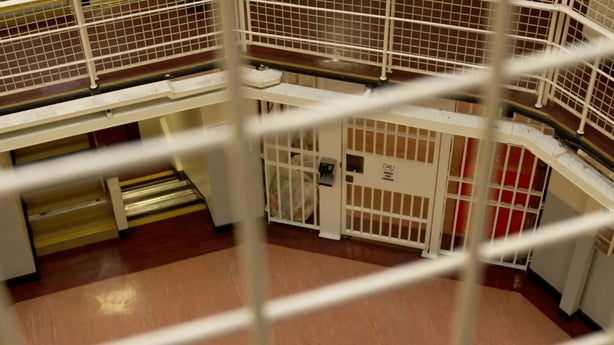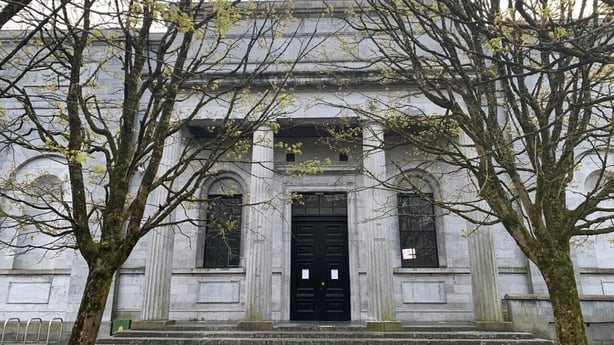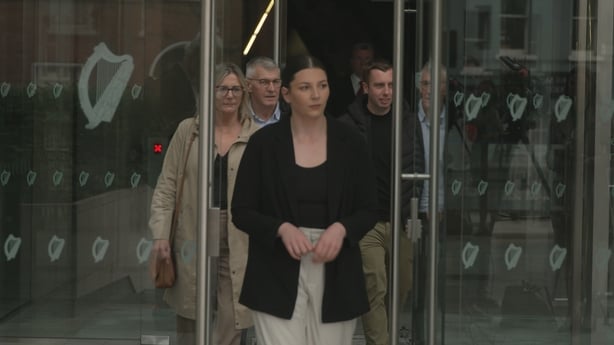World
‘No apology’ – how Jonathan Moran refused to admit rape

The former captain of the senior first men’s rugby team in Mullingar could hardly have imagined when he was celebrating his 100th cap for the club, that he would be waking up this morning in a prison cell in the sex offenders’ unit in Mountjoy jail.
Jonathan Moran is a 26-year-old protected prisoner in an overcrowded jail where on his first night last Monday, 110 prisoners had no beds and slept on the floor.
Mountjoy is where the prison service detains members and associates of the Kinahan organised crime group to keep them from their feuding rivals in the Hutch organised crime group.
Moran is isolated from other violent and gangland criminals who have mothers, daughters, wives and girlfriends and have a particular dislike of predatory sex offenders.
As the criminal gang leader and convicted murderer Brian Meehan pointed out more than a quarter of a century ago, “there’s only two types of prisoners that end up there, rapists and rats”.
Prisoner 123815
“He thought I wasn’t even worth the reason. He saw an opportunity. I can do this and get away with it. He didn’t care.”
Prisoner number 123815 is serving a nine-year sentence with one year suspended. He is entitled to remission but will spend at least six years behind bars. He has plenty of time to think about what he did and why.
If he has any possible reason, explanation or excuse for his abhorrent behaviour, he hasn’t shared it. The presiding judge in the case said he doesn’t know what was in Moran’s mind at the time. The survivor of his attack said she doesn’t know why he did it.
Bláthnaid Raleigh said however she would like to know, not to excuse it, but to try to further heal and move on.
“He thought I wasn’t even worth the reason,” she said. “He saw an opportunity. I can do this and get away with it. He didn’t care.”
Up till now and for whatever reason, not only has Jonathan Moran not told anyone why he committed such a brutal rape during which he used three plastic bottles on his victim, he has wallowed in arrogant, corrosive and self-focused denial.
This approach has not served him well.
Denial has cost him the benefit of the mitigation that comes from accepting responsibility, usually a 25% reduction in prison time. His defence counsel said he belatedly accepted the verdict of the jury that found him guilty, but he has not taken responsibility or apologised for what he has done.
He remains, according to his probation report, at “moderate risk of reoffending”. That means there is a reasonable chance he would do it again.
And if he pleaded not guilty during the trial because he believed that the evidence was not there to convict him, he was badly mistaken.
A horrific rape in Galway
Bláthnaid Raleigh had just completed the third year of her degree in early childhood education in Limerick. She and a friend decided to head off to Galway for a night in July 2019.
By chance they met a group of lads who were also from her hometown, Mullingar. Her friends knew them from the local rugby club. One played rugby with them, another knew one of them through a family connection. It was all very comfortable, normal and apparently safe.
One of Bláthnaid’s friends had to leave during the course of the evening to look after his girlfriend who had drunk too much.
Another headed off with others but made sure to ask Bláthnaid if she was ok and Bláthnaid assured her she was. The 21-year-old, who described herself as “carefree and fun”, was happy to stay and later accepted an invite from the lads to go back to a party at their Airbnb rental.
She headed back with the group to the house where they chatted and had a few drinks and later found herself alone with Jonathan Moran. Moran was a local lad also from Mullingar who went to school at the Community College.
“It got very hostile very quickly. He just changed. The real guy came out.”
He was also 21 years old and came from a good home, from a good family and was a good employee in the factory he worked in – until he was jailed.
He played rugby for the local club where he was known to be quiet but sociable and “always one of the lads”. The rugby club served him well. The connections he made there secured him his job.
Bláthnaid had also played in the club as a young girl, as had her father, her uncles and her grand uncle. Her family had been rooted in the club for generations.
Moran was the hooker, a position which requires power and strength. He was part of mauls, to smash into opponents, and receive short ‘crash’ passes.
At over six foot tall he was quite simply a big, strong, powerful, brooding young man.
Moran had been friendly all evening. The conversation was platonic, not flirty, and everything was fine until the early hours of the morning when suddenly, he turned off the light in the room. It quite literally flicked a switch on his personality.
“A totally different person entered the room,” Bláthnaid said. “It got very hostile very quickly. He just changed. The real guy came out.”
Moran first tried to initiate sexual contact in the house.
“No” Bláthnaid told him, several times.
Moran became aggressive and verbally abusive.
“Oh for f*** sake,” he replied.
The atmosphere became tense, threatening, uncomfortable and dark.
Bláthnaid felt she needed to calm the situation.
She was afraid of Moran; afraid he might hit her. So, when he wanted to go outside for a cigarette, she went with him.
Outside, he went into the shed but when she went with him, he shut the door. She realised she was trapped. It was a small space and the door opened inwards. Once she was pushed against it she couldn’t get out.
“I reached for the handle,” she said. “This is closed,” she told him.
He didn’t care. He never spoke. He attacked her. He forced her head against the door and raped her.
The savage nature of the attack is clearly conveyed in the wording of the two charges of Section 4 rape and aggravated sexual assault subsequently preferred against Jonathon Moran. They coldly state the horrific details of the attack in a garden shed in Galway on 21 July 2019.
Even the words are difficult to read. The actions are more difficult to comprehend.
Moran only stopped because he heard voices outside. Bláthnaid had been banging on the door and two other young men who were also at the party came to the door. They opened it inwards from outside which enabled Bláthnaid to escape.
The kindness of strangers
Numbed, shocked but remaining dignified, Bláthnaid Raleigh walked back to the house. She went into the bathroom where she discovered she was bleeding and badly injured. She gathered her belongings and walked barefoot out the door just after 5am. She closed it behind her and then in her own words, she “fell apart”.
Bláthnaid had no idea where she was. She rang her boyfriend who was on a J1 working holiday visa in the US and cried. She walked up the road and as she passed a casino a girl came up to her and asked if she was alright.
She told the stranger she couldn’t find her friends and didn’t know where she was staying but the girl sat with her on a shop windowsill and reassured her that everything would be ok.
However, a man who was with the girl watched for a while and realised everything was not ok. He knew something was not right with this girl who was upset and crying and looking for her friends.
He knew something had happened to her and asked her to come with them to the gardaí. The couple guided Bláthnaid to the garda station and she never saw them again.
The irony is that it was a person she thought she knew from home and could trust who did so much damage to her, while it was strangers who helped her that night and unbeknownst to themselves, laid the foundations for the prosecution and conviction.
The actions of the couple meant that the investigation into these most serious sexual offences could immediately begin and that most, if not all, of the incriminating evidence that proved Jonathon Moran to be a violent rapist was preserved.

Read more:
Man who raped woman with bottle in garden shed jailed for eight years
Important to have rapist’s face ‘out there’, says victim
Five years of life ‘lost’ waiting for rape trial – Raleigh
The garda investigation
Bláthnaid Raleigh did not get back to where she was staying to take a shower. The uniformed gardaí listened to her and moved quickly. They put her in a patrol car to retrace her steps.
She noticed something familiar, a pub she had seen, then the shop where she sat on the windowsill and working their way back along the route she took, they arrived at the place where the rape took place.
Bláthnaid was taken to the Sexual Assault Treatment Unit in Galway and gardaí secured a search warrant. They arrived at the rented property before midday, sealed it off as a crime scene and arrested Jonathan Moran.
There hadn’t been time to clean up or dispose of evidence. The three plastic cordial bottles were still in the shed and Bláthnaid’s DNA was discovered on them. The forensic evidence was crucial to the conviction.
Jonathan Moran lied and lied and lied again during his garda interviews.
“No I didn’t do that, that’s not my thing, I’m not into that.”
He told the gardaí he didn’t know Bláthnaid, who she was, or even what her name was, but tripped himself up when he referred to her by name.
He falsely accused her of initiating sexual activity between them.
He said he had been respectful and had asked for consent the whole way through, even though he had been told ‘no’ several times.
He made up a story about them lying on the couch together, cuddling and falling asleep. He said when he woke, she was gone and the first thing he knew about all this was when gardaí arrived in the morning.
However, the cameras trained on the inside and outside of the terraced house and the CCTV footage proved Moran was again lying. It showed them going in and coming out of the shed and a very distressed Bláthnaid then leaving the house.
Gardaí asked him why he thought Bláthnaid was so upset. He told them he had made a joke about having sex with her to the two men who arrived at the shed, and this had upset her.
Again, this wasn’t true, and the two men, who had been friends of Moran, testified against him in court that he said no such thing.
When asked how Bláthnaid’s DNA could have ended up on the plastic cordial bottles he replied “maybe she fell”. When asked did he see her fall, he replied “no”. When asked did he see her drink from a bottle he replied “no”.
When it was put to him that he had seriously injured her, he denied he had done any harm; “No I didn’t do that, that’s not my thing, I’m not into that,” he said.
Isolation

It took five years for the case to be finalised.
Moran was arrested three times during the course of the investigation. The first time was in the house that morning; the second when the forensic evidence came back from Forensic Science Ireland and had to be put to him, and the third arrest was when he was charged and brought before Galway District Court.
Innocent until proven guilty, he was released on bail.
The case was adjourned several times for a variety of reasons including the lack of judges and Covid-19. Moran pleaded not guilty, so a trial date had to be set – but time and again Bláthnaid prepared for the case to commence, only to be told at the last minute it was being pushed back for another year.
“It feels like a puppet on a string, you feel like someone’s controlling your life, and for victims of sexual violence that is not a nice place to be,” she said.
Bláthnaid managed to finish the final year of her degree, but her life remained on hold. She was unable to move on. She was “a shell” of her former self. She spent most of her time “staring into space”.
She sat at home, consumed by fear and anxiety, not going out, with little motivation to do anything. She wasn’t sleeping, she scratched her skin, she had night terrors, flashbacks and bad dreams.
She required “invasive and ongoing” treatment in the sexual assault unit for months
“This was a constant and physical reminder of the damage caused to my body,” she said.
She tried to move on, even forcing herself to go out when she knew she wasn’t ready. She would sit in a pub with her back to the wall to be able to see everyone coming and was particularly wary in case Jonathan Moran appeared.
She watched every girl talking to every guy and was petrified for every girl leaving the pub on her own or getting into a taxi alone.
Her mother tried to cheer her up and take her shopping, but she had no interest in clothes. The passing smell of aftershave repulsed her and led her to once become violently ill in a shopping centre toilet.
A perfect rugby life
In marked contrast, Jonathan Moran’s “perfect life” continued for those five years. He couldn’t be identified so very few people knew what he had done and that he had been charged with rape.
He continued working, socialising and playing rugby. He did an apprenticeship in Limerick and was even offered a promotion in work, which he knew he had to turn down because of the case. His fellow employees couldn’t understand why.
Moran was celebrated in the rugby club and on social media when he got his 100th cap and congratulatory messages and pictures of him playing and partying were widely circulated.
One of Bláthnaid’s brothers quietly left Mullingar Rugby Club because of Moran’s attack on his sister. He couldn’t tell anyone why. He joined Tullamore Rugby Club in the next big town, a controversial act in rural Ireland, which caused some consternation in Mullingar.
He was subjected to verbal abuse and “sledging” on the pitch from former clubmates because he had transferred to the local rival club. He even played a game against a Mullingar team that included Jonathan Moran, his sister’s rapist, and was accused by those who didn’t know why he left, of “thinking you’re better than us”.
Mullingar Rugby Club has since expelled Jonathan Moran following a committee meeting on 19 June. In a statement it said it was “deeply shocked and saddened” by his crime.
“We condemn and are appalled by this act,” it said, “we are committed to promoting a culture of respect, integrity, and zero tolerance for any form of abuse and to upholding the values of sportsmanship, integrity, and respect for all”.
Court proceedings

When the case finally came to trial, Jonathan Moran stayed silent, as is his right. He sat in the dock and said nothing as the State proved its case against him. He never spoke at all during the proceedings.
Even when the court registrar read out the terms of his bond to him before he was led away and asked him if he would abide by them, he just nodded. His steadfast refusal to accept what he did forced his victim to take the stand and testify against him.
If he gambled on the possibility that she would buckle or crumble, he made the wrong bet. Bláthnaid’s testimony was clear and concise. Her evidence was corroborated but the judge noted afterwards that because she was so convincing, Moran might well have been convicted even without the forensic evidence.
The court case was still a difficult experience. Bláthnaid discovered she was a witness in a case being taken by the State.
“It brings up a lot of feelings,” she said, “detail you haven’t dealt with. All of a sudden in a room full of people and you’re talking about it. It’s hard to hear other people talking about it. You have to tell it all to a group of strangers, but you’re not just a witness. This has happened to you.”
That roll of the dice to deny what he did, cost Jonathan Moran dearly. An early admission of wrongdoing is important to many victims. It is valuable in that it serves as early vindication of the victim and prevents them from having to revisit upsetting and distressing matters in front of a jury. It also saves time and expense.
If he had admitted his crime and pleaded guilty, he would have had to serve at least two years less in jail.
But Jonathan Moran was determined to the end to deny and minimise what he had done. A character reference, purporting to be from his employer, had been prepared to be handed into the court, but last Monday it was withdrawn.
It transpired his employer knew nothing about it, was not supporting it and had made it clear it was not to be submitted on its behalf.
Moran didn’t tell his employer that he had been charged, or subsequently convicted of rape, and continued to work up to Friday 14 June. It was the last day he could have been in work anyway. He was remanded in custody the following Monday.
Moran outed
“He’s not your typical sexual predator. They are amongst us in our peer groups. There are young men doing this.”
Bláthnaid Raleigh decided that Jonathan Moran had to be publicly named. A perpetrator is legally entitled to anonymity to protect the identity of the victim, but Bláthnaid waived her anonymity which allowed the case to be reported and pictures of Moran to be circulated.
She got some comfort from people knowing what he did and what he was hiding while she was feeling totally isolated. There were a lot of sleepless nights and she read numerous reports of sex offence prosecutions but was never able to put a face to a rapist.
She felt that the perception of the sex offender as a grubby old man in the dirty raincoat did not reflect the reality of these criminals.
“I really needed to bring attention to this, the image of what the perpetrator looks like,” she said. “He’s not a creepy old man, but educated, playing rugby and presenting as very normal to his peers.
“He’s not your typical sexual predator. They are amongst us in our peer groups. There are young men doing this.”
She had nothing to be ashamed of, it was Jonathan Moran who should be ashamed. She told him she was “handing the shame back to you”. She’s now running a raffle for the place that has helped her so much, The Tullamore Rape Crisis Centre.
“It’s bad enough that he did it, worse that he denied it and worse again that he showed no remorse”, one of Bláthnaid’s relatives said, “he never looked or even acknowledged our existence in court”.
Consent
Jonathan Moran consistently ignored Bláthnaid Raleigh when she said “no”. In jailing him Mr Justice Tony Hunt stressed the importance, particularly for young people, to bear in mind the need for consent. Those who ignore it he said, “do so at your own peril”.
“Perhaps if Mr Moran’s case and the consequences for him could be illustrated to younger people it might make a difference,” he said “because the consequences are very severe and tend to fall on people who have previously no engagement with the criminal justice system”.
“It is important that people don’t find themselves in the position Mr Moran is in, or put people like Ms Raleigh in the situation she was in.
“I say this as an appeal to people to exercise more care, not as a lecturing old person. It’s a pity people just don’t think about what they’re doing a little bit more.”
It’s difficult to know if Jonathan Moran is the type of person who would even consider consent or stop to think about what he was doing before he did it.
The answer to that may not be known until he not only accepts the full horror of what he has done, but also perhaps then explains why he did what he did to Bláthnaid Raleigh.
Bláthnaid Raleigh has organised a fundraiser raffle in aid of Tullamore Rape Crisis Centre.
If you have been affected by any of the issues raised in this article, helplines can be found here.










